Development Economics
Economic development in developing countries
cannot be achieved by economic rationality alone.
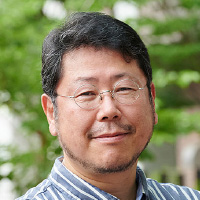
WATANABE MatsuoProfessor, College of International Relations
Direct link between rural Ghana and the global market
Presenting new business models to the world
What is development economics?
WatanabeDevelopment Economics is the study on poverty alleviation and development in developing countries from an economic perspective. The topic I am working on is exploring new ways of rural industrialisation in Ghana. Farmers' incomes are limited if agricultural products are marketed as they are. In the past, overseas businesses added value by, for example, turning fruit into juice and cacao into chocolate. As a result, only a small percentage of profits from juice and chocolate have been generated by raw material procucers, i.e. developing countries. Therefore, rural villages in developing countries themselves process local agricultural products, which are then sold domestically and internationally to generate profits and raise their living standards. I am exploring the possibilities of such agribusiness.
Agro-industrialisation is not a new development issue. However, a unique focus of this research is on marketing with particular attention to product design looking to the global market such as packaging and hygienic aspects among others. We are seeking for workable ways to create more value added in developing country side. My research partners include marketing and design specialists. They have had a package design contests in Ghana inviting young Ghanian industrial designers and students to foster human resources in that context.
What is the difference from business in Japan?
WatanabeRural communities in developing countries have limited capital, indeed. And their access to credit or external capital is also limited. Allocations of loans or public assistance are highly political. Priority is often given to those who have connections with local politicians and influential persons.
What do you find interesting about your research?
WatanabeEssentially this kind of research is not complicated, finding commonalities of successes and failures in many cases and theorising from them. However, visiting the field, seeing, hearing, and discovering are fun themselves; and it is also appealing to me if I can link my findings to a solution to real-world development issues.

Dry fruits (left) and herbal tea (right).
Like these products, trying to find realistic ways for producers to make products with more added value within developing countries.
As advisor to the Prime Minister on economic policy
To Bosnia and Herzegovina after the civil war
From 2005 to 2006, Professor Watanabe served as an economic policy advisor to the Prime Minister of Bosnia and Herzegovina. Could you tell us about that time?
Watanabe I was dispatched by the Japanese Government 10 years after the Dayton Peace Agreement, signed in 1995. This was just around the time that the four countries of Japan, Germany, India and Brazil were urging the world to reform the UN Security Council.
Over there, I sometimes spoke directly to the Prime Minister, but I had a lot of discussions with other PM aides in charge of economic policy planning in the Council of Ministers. I also taught basic statistics for macroeconomic estimation to young bureaucrats; and I was responsible for the chapter on industrial development in the national development strategy which the Bosnian Government was formulating at the time.
To prevent the recurrence of violent conflicts and realise rehabilitation and longer-term development, ensuring social stability through the creation of jobs was an urgent issue. One time I was asked if Bosnia could invite a Toyota Motor factory.
I can understand their desire to develop the automobile industry to create jobs and more importantly as a catalyst for industrial development in Bosnia. The industry involves a very broad industrial base, part suppliers and even service sectors for, say, workers. Besides job creation, technological upgrade of the entire industrial sector of the country could be expected.
However, it is easier said than done. A vehicle has approximately 40,000 to 50,000 parts. The production management of motor vehicles was already highly sophisticated. In addition, an international supply chain from parts procurement to sales was already established at that time; however, Bosnia’s infrastructure and institutions were insufficient to participate in this global network. I remember the many times we discussed that the gaps between the world they envisioned in their minds and reality were deeper than they thought, and that the dauntingly steady and patient efforts were inevitable to bridge, especially given the situation in Bosnia which were divided by the conflict.
In both developed and developing countries, economic and social policies are swayed by domestic and international politics. In Bosnia, where Bosniak, Serbian, and Croatian political forces were at odds, political considerations were particularly essential. For example, support for the establishment of health centres in the country required consideration of a balance in the number of such centres between the two Entities (administrative units) rather than the necessities. No single policy measure or foreign assistance could be materialised without this balance consideration.
Economic and social policies should be inevitably formulated based on the political background of the country. My experience in Bosnia tells me that each country's political climate is different, and that it is impossible to formulate feasible policies without knowing it. I believe that the economic policies that the international community prescribes to recipient countries should be consistent with the context of each country.
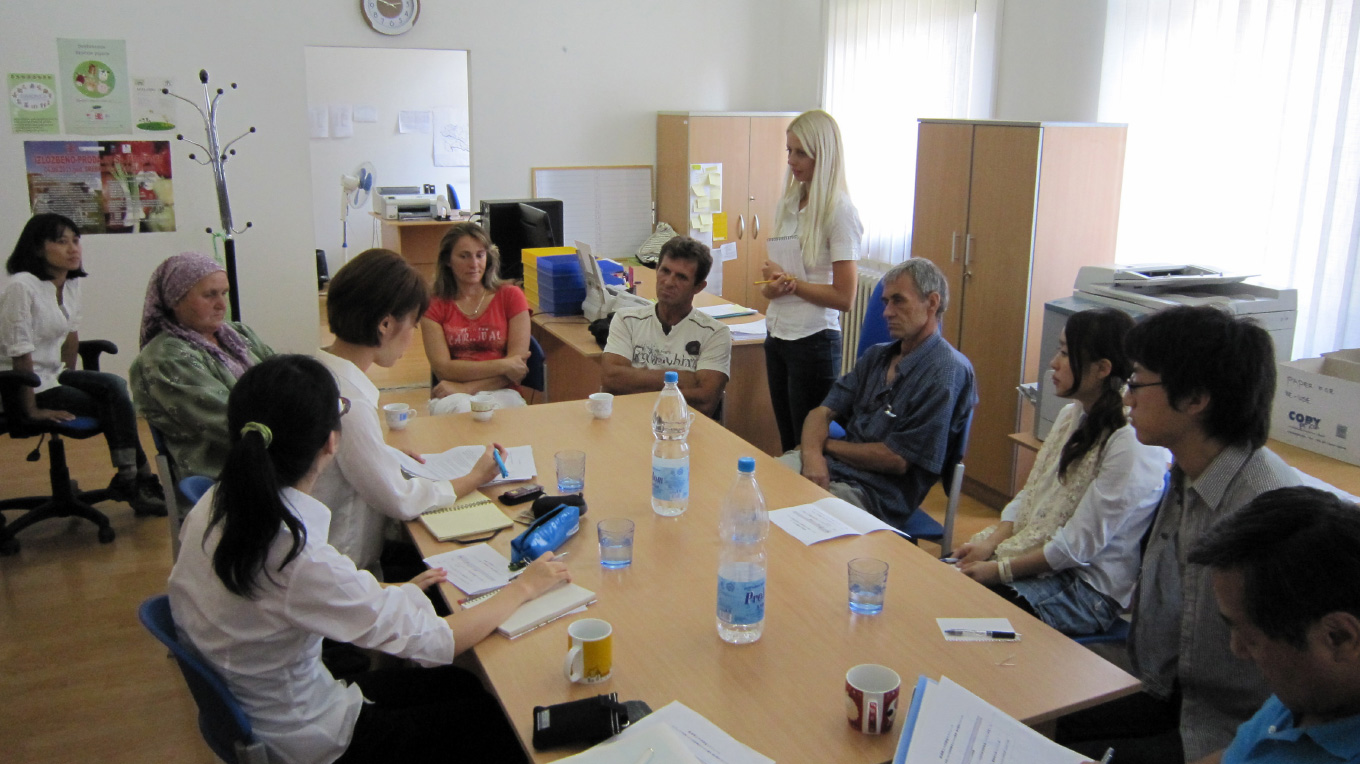
An interview survey was conducted with the genocide survivors in Bosnia by students from the Advanced Seminar.
In addition to economics, knowledge of a wide range of
fields is essential to understand the complex process of
economic development in developing countries.
How do you perceive the significance of studying economics in the College of International Relations?
WatanabeI think it is extremely significant, indeed. For example, consider regional integration aimed at facilitating trade and investment, aligning institutions, and so on. If we eliminate tariffs, the flow of goods will increase, and corporate profits and household incomes may increase in an economy as a whole. However, it is essential for the government concerned to pay attention to the domestic sectors (e.g. industries, workers, regions), which are losing out to competition and declining due to economic liberalisation. Regional integration, an international treaty, is a very political process of negotiation leading up to its conclusion, as the domestic circumstances of these countries clash.
Economic rationality cannot be the only objective of regional integration, especially in developing countries. There is also a very political prospect that the media coverage of the sunny scene of the treaty signing will appeal to the domestic constituencies for the next presidential election.
As I have mentioned, the process of economic development in every developing country is very complex. Decisions and actions of people and nations are influenced by various factors. To gain a deep understanding of such complexity and make a valuable talent in academic research and/or practice, it is essential to study diverse disciplines ----- international politics, history, cultural studies, and regional studies besides economics. I believe that is the meaning of studying development economics in the College of International Relations.
For Those Interested in
Development Economics: BOOKS
ジョセフ コンラッド
闇の奥
岩波書店(1958)
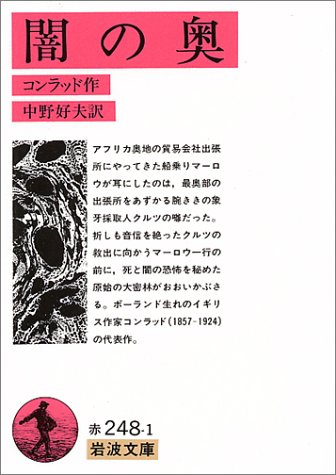
白戸 圭一
ルポ 資源大陸アフリカ―暴力が結ぶ貧困と繁栄
朝日新聞出版(2012)
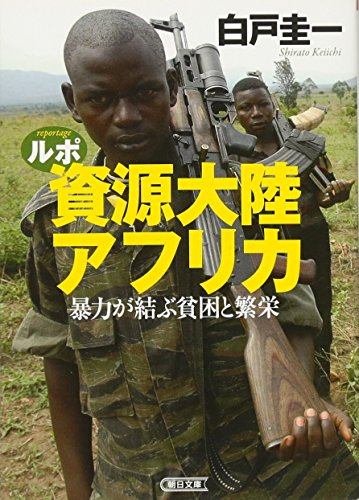
Richard C. Holbrooke
To End a War: The Conflict in Yugoslavia
--America's Inside Story--Negotiating with Milosevic
Modern Library(1999)
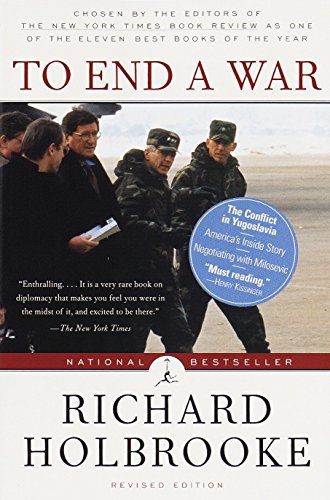
For Those Interested in
Development Economics: FILMS
映画
サラエボの花
2006年、ボスニア・ヘルツェゴビナ、オーストリア、ドイツ、クロアチア
映画
ブラッド・ダイヤモンド
2006年、アメリカ